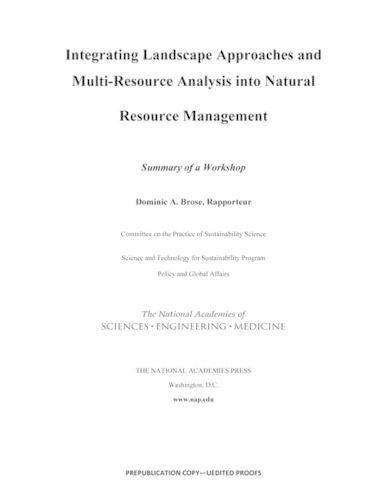Readings Newsletter
Become a Readings Member to make your shopping experience even easier.
Sign in or sign up for free!
You’re not far away from qualifying for FREE standard shipping within Australia
You’ve qualified for FREE standard shipping within Australia
The cart is loading…






The responsible management of natural resources for present-day needs and future generations requires integrated approaches that are place-based, embrace systems thinking, and incorporate the social, economic, and environmental considerations of sustainability. Landscape-scale analysis takes this holistic view by focusing on the spatial scales most appropriate for the resource types and values being managed. Landscape-scale analysis involves assessing landscape features in relation to a group of influencing factors such as land use change, hydrologic changes or other disturbances, topography, and historical vegetation conditions.
As such, different types of data and multiple disciplines may be required for landscape analysis, depending on the question of interest and scale of analysis. Multi-resource analysis (MRA) is an approach to landscape-scale analysis that integrates information among multiple natural resources, including ecosystem services, and is designed to evaluate impacts and tradeoffs between development and conservation at landscape scales to inform public resource managers. This approach implicitly addresses social, economic, and ecological functional relationships; for example, actions to realize the benefits of one type of natural resource (e.g., minerals, oil, and gas) may influence behavior and potential benefits related to other types of natural resources (e.g., recreational opportunities).
In June 2015, the National Academies of Sciences, Engineering, and Medicine convened a workshop on using landscape-based approaches and MRA to better inform federal decision making for the sustainable management of natural resources. Participants discussed knowledge gaps and priority areas for research and presentations of case studies of approaches that have been used to effectively integrate landscape-based approaches and MRA into practice. This report summarizes the presentations and discussions from the workshop.
$9.00 standard shipping within Australia
FREE standard shipping within Australia for orders over $100.00
Express & International shipping calculated at checkout
The responsible management of natural resources for present-day needs and future generations requires integrated approaches that are place-based, embrace systems thinking, and incorporate the social, economic, and environmental considerations of sustainability. Landscape-scale analysis takes this holistic view by focusing on the spatial scales most appropriate for the resource types and values being managed. Landscape-scale analysis involves assessing landscape features in relation to a group of influencing factors such as land use change, hydrologic changes or other disturbances, topography, and historical vegetation conditions.
As such, different types of data and multiple disciplines may be required for landscape analysis, depending on the question of interest and scale of analysis. Multi-resource analysis (MRA) is an approach to landscape-scale analysis that integrates information among multiple natural resources, including ecosystem services, and is designed to evaluate impacts and tradeoffs between development and conservation at landscape scales to inform public resource managers. This approach implicitly addresses social, economic, and ecological functional relationships; for example, actions to realize the benefits of one type of natural resource (e.g., minerals, oil, and gas) may influence behavior and potential benefits related to other types of natural resources (e.g., recreational opportunities).
In June 2015, the National Academies of Sciences, Engineering, and Medicine convened a workshop on using landscape-based approaches and MRA to better inform federal decision making for the sustainable management of natural resources. Participants discussed knowledge gaps and priority areas for research and presentations of case studies of approaches that have been used to effectively integrate landscape-based approaches and MRA into practice. This report summarizes the presentations and discussions from the workshop.